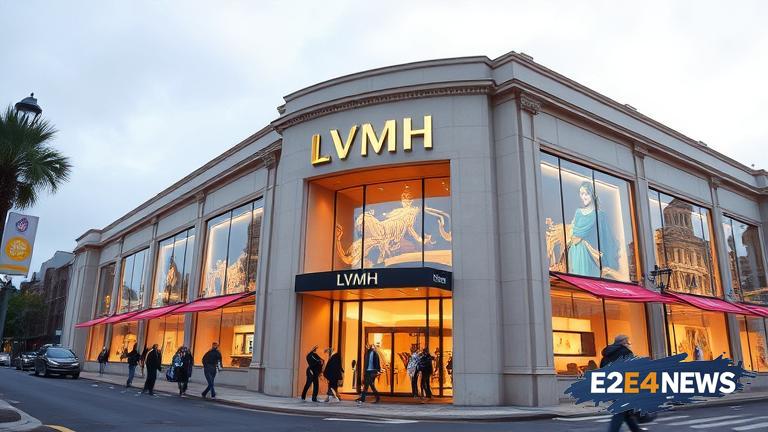The luxury goods market, which has experienced unprecedented growth in recent years, is now facing a significant slowdown. LVMH, the parent company of iconic brands such as Louis Vuitton, Moet & Chandon, and Tiffany & Co., is not immune to this trend. The company’s stock price has been volatile in recent months, reflecting the uncertainty surrounding the luxury market. According to industry experts, the slowdown is attributed to a combination of factors, including a decline in consumer spending, increased competition, and a shift in consumer preferences. The COVID-19 pandemic has also had a lasting impact on the luxury industry, with many consumers opting for more affordable and sustainable options. LVMH’s revenue growth has slowed significantly, with the company reporting a decline in sales in several key markets, including China and the United States. The company’s fashion and leather goods division, which accounts for the majority of its revenue, has been particularly affected. Despite this, LVMH remains committed to its strategic plan, which includes expanding its presence in emerging markets and investing in digital transformation. The company has also been focused on building its e-commerce capabilities, with online sales now accounting for a significant proportion of its revenue. However, the luxury market is highly competitive, and LVMH faces significant challenges from rival companies such as Kering and Richemont. The company’s ability to adapt to changing consumer preferences and maintain its competitive edge will be crucial in navigating the current slowdown. LVMH’s CEO, Bernard Arnault, has stated that the company is well-positioned to weather the storm, citing its strong brand portfolio and diversified business model. However, some analysts have expressed concerns about the company’s high valuation and the potential for further declines in the luxury market. The slowdown in the luxury market has also had a ripple effect on the wider economy, with many small businesses and suppliers relying on the industry for their livelihood. As the luxury market continues to evolve, it is likely that LVMH will need to innovate and adapt in order to remain competitive. This may involve investing in new technologies, such as artificial intelligence and blockchain, as well as expanding its presence in emerging markets. The company’s commitment to sustainability and social responsibility will also be crucial in appealing to the increasingly conscious consumer. In conclusion, LVMH is facing a challenging period amid the global luxury slowdown, but the company’s strong brand portfolio and diversified business model position it well to navigate the current market conditions. With its focus on digital transformation, sustainability, and emerging markets, LVMH is likely to remain a major player in the luxury industry for years to come. The company’s ability to adapt to changing consumer preferences and maintain its competitive edge will be crucial in determining its long-term success. As the luxury market continues to evolve, it is likely that LVMH will need to innovate and invest in new technologies and business models in order to remain ahead of the curve. The current slowdown in the luxury market presents both challenges and opportunities for LVMH, and the company’s response will be closely watched by investors and industry analysts alike. The luxury goods market is highly cyclical, and it is likely that the current slowdown will be followed by a period of growth and expansion. LVMH’s ability to navigate the current market conditions and position itself for future growth will be crucial in determining its long-term success. The company’s strong brand portfolio and diversified business model provide a solid foundation for future growth, but the company will need to continue to innovate and adapt in order to remain competitive. The global luxury slowdown has significant implications for the wider economy, and LVMH’s response will be closely watched by investors and industry analysts alike. The company’s commitment to sustainability and social responsibility will also be crucial in appealing to the increasingly conscious consumer. As the luxury market continues to evolve, it is likely that LVMH will need to invest in new technologies and business models in order to remain ahead of the curve. The current slowdown in the luxury market presents both challenges and opportunities for LVMH, and the company’s response will be closely watched by investors and industry analysts alike.





